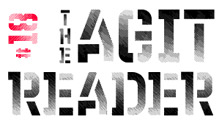
Suicidal Tendencies
Frontier, 1983
As a teenager living in a high-end suburban wasteland, there were few things that broke the boredom of such a bleak landscape. Skateboarding was one, terrorizing the sidewalks, curbs and loading docks of the encompassing strip malls. Music was the other, and few records at once captured and shattered the ennui of a middle America adolescence the way the Suicidal Tendencies’ first self-titled record did.
Here was a record that took the apathy created by school, Cold War paranoia and parental supervision, and infused it with the taboos of those very same institutions. On the first track they proffer that “Suicide’s an Alternative,” capturing teenage angst not with a whine but with a defiant possible solution. Similarly, the album’s “hit” (by underground standards, the minimal play on MTV and the band’s appearance on Miami Vice constituted a breakthrough), “Institutionalized” captured adolescent despair in a way few others have, not to mention the en vogue response for dealing with teenage despondency in the ‘80s. By comparison, kids these days have it easy with their ritalin and whatnot. Back then it wasn’t uncommon for a teen to get locked away simply for exhibiting a few anti-social behaviors. One minute singer Mike Muir is asking for a Pepsi and the next he’s cordoned off in some “institutional learning facility.”
While the record is considered a classic of hardcore’s latter days, Suicidal Tendencies show more than the standard full-steam, four-four beats and shout and huff. While there’s some of that (“Two Side Politics,” “Memories of Tomorrow”), they get dynamic even within that dynamic (“Possessed”) and break from it all together (“I Saw Your Mommy”). Hell, Muir even attempts to sing (“I Want More”). It all amounts to an album that dissects hardcore’s formula while at the same displays some of the traits that would define the thrash metal to come.
But even the packaging added to this record’s potency, an enigmatic photo of the band by Glen Friedman surrounded by various handmade gangwear. (Suicidal Tendencies were supposedly affiliated with a California gang and in turn were rivaled by FFF, both a gang and a band at one point). Combined with Muir’s diatribes on assassinating Reagan, internal demons and general adolescent malaise, there was no better record with which to come of age. Still, Reaganisms aside, the record holds up 25 years later, as derisive and poignant as it was when released.
Stephen Slaybaugh
PAST PERFECTS
Tom Verlaine, Dreamtime and Words from the Front
Wee, You Can Fly on My Aeroplane
Licorice Roots, Melodeon
Another State of Mind
Delicious Vinyl All-Stars, Rmxxology
Felt, Crumbling the Antiseptic Beauty
Siltbreeze's Tard & Further'd
U2, Boy, October and War
Teenage Jesus and the Jerks, Beirut Slump/
Shut Up and Bleed
Black Sabbath, The Rules of Hell
David Bowie, Live Santa Monica '72
Children of the Sixth Root Race, Songs from the Source
Blondie, Parallel Lines Deluxe Collector's Edition
Mogwai, Young Team
